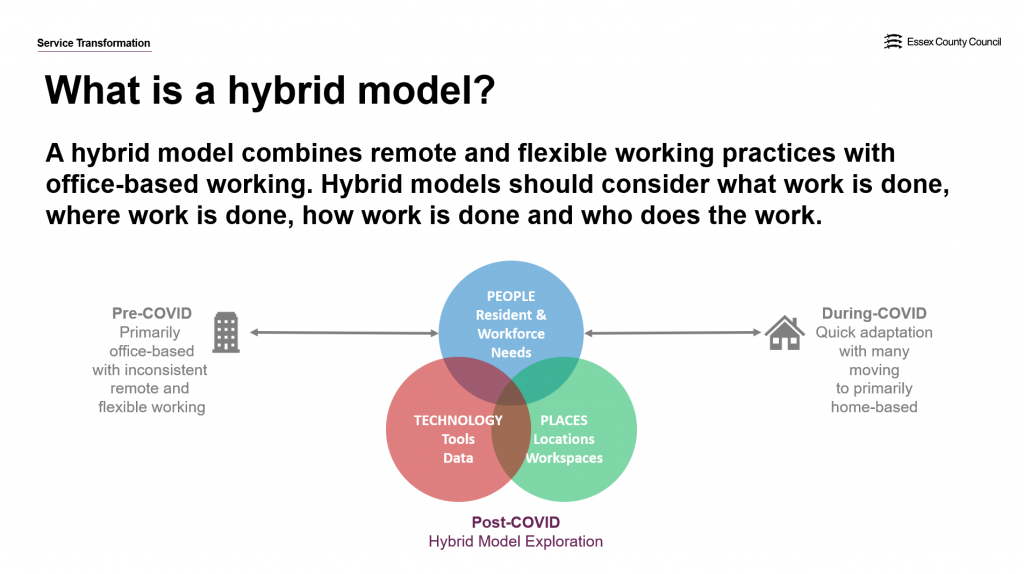Back in March we shared some details of the framework we’ve designed to explore the rapid move to hybrid ways of working at Essex County Council.
We’ve been continuing our work and are now starting to use this to influence and support decision-making around ECC’s future working models.

Our initial research told us that remote working (team members working in various locations, conducting their work through virtual/online tools) can have a positive impact on the individual and the organisation - when it doesn’t happen all the time and it is by choice. Our aim was to help the organisation identify the right level of flexibility and choice around ways of working for different services, teams, and individuals.
Over the past 12 months we have shown that in a lot of cases there is no need to tie work to a fixed location to ensure the productivity of teams and the delivery of outcomes for end users. However, we’ve also learned there are certain aspects of the work that are far better performed in the same location, at the same time with colleagues (complex collaboration work, team building, relationship building). This has helped us to move our focus from “where does work need to happen” to “what are the critical enablers to facilitate the different activities we need to perform”.
We know that most organisations are working hard to adapt to the post-Covid environment, so we’re releasing the framework we have created with some supporting guidance under a creative commons license so that it can be reused and adapted.
How you can use the framework to explore hybrid working in your organisation
The framework is an exploratory tool that helps teams to reflect on the changes they have experienced, and what this means for their future ways of working. It’s not a ‘tick-box’ exercise that gives you all the answers – it’s more a way of engaging your colleagues in meaningful conversations about the future.
To help people understand and use the framework, we’ve created some guides, templates, and supporting information including:
- a downloadable PDF of the hybrid model framework
- we’ve summarised our approach in a hybrid model framework summary miro board - this walks you through the creation of the framework and how we’re using it.
- we’ve put together a hybrid model framework guide miro board which shows a worked example of the approach in action. This brings to life how we are planning and facilitating the exploration conversations and shows how we bring together insights from what we’ve heard.
- and we've created a couple of more accessible document versions for download - there's a Word user guide and an Excel version of the framework.
What are our next steps?
We are using this approach to help our teams to articulate the best possible hybrid working model for them. As part of the implementation process, we are identifying the support that our managers and team members will need to make the identified hybrid working model work for them. We've also started to build out a set of 'working styles' that are helping our colleagues to explore the similarities and differences across teams.
Sharing experiences and iterating together
We’ll be continuing to use the framework as we work with new teams over the next few months, including colleagues from social care and our place and public health functions. We’ll be keeping an eye on whether the framework will need to be adapted to support these conversations and will keep sharing our progress as we learn.
We hope you find this approach useful and would love to hear from anyone who would like to share notes and ideas.
1 comment
Comment by Kim Parfitt posted on
Really interesting - thanks for sharing. Would love to chat more about your service by service approach